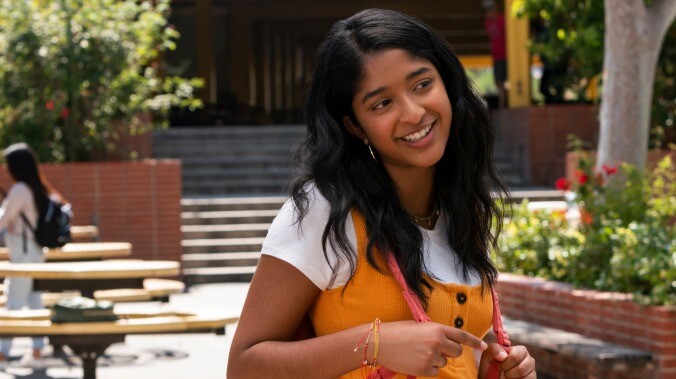Never Have I Ever gives us The Mindy Project: The Early Years

Fans of Mindy Kaling’s The Mindy Project will find her new Netflix series, Never Have I Ever, pretty familiar. The setting has changed—from a New York doctor’s office to a high school in Sherman Oaks, California—but the main character is a self-absorbed young Indian American woman who unfurls hilarious self-deprecations like “I got fired from retail. They said my hands were too sweaty to fold clothes.”
But Kaling has dug even deeper into her own personal history to create Never Have I Ever along with Lang Fisher. Protagonist Devi is a student at Sherman Oaks High whose family moved to the U.S. from India (just like Kaling’s did), an overachiever with her eye on Princeton (Kaling went to Dartmouth). Her mom (Poorna Jagannathan) is a doctor (like Kaling’s was); her father (Sendhil Ramamurthy) recently died of a heart attack, and the trauma over his passing caused Devi’s legs to stop working for three months.
Devi’s legs have recovered, and entering her second year of high school, she’s out to reinvent herself. She’s aided by fellow nerd best friends Fabiola (Lee Rodriguez) and Eleanor (Ramona Young), who help her decipher sexual positions with the aid of stuffed animals. Devi also pines over Paxton (Darren Barnet), the dreamiest boy in Southern California, and constantly spines with Ben (Jaren Lewison), her academic rival. But mostly, Devi is just trying to fit in, while her family’s traditions and her mother’s strict rules are bound to make her stand out. In one of this first season’s most effective episodes (“…Felt Super Indian”), she runs into a friend at a Ganesh Puja celebration, where he reveals how he began to embrace his Indian heritage once he went off to college; Devi is still a long way from that kind of acceptance.
Devi’s preoccupation with popularity (and Paxton) distract her from her real issues—like coming to terms with her dad’s death. That emotionality, combined with her various cultural hurdles, make Devi’s adolescent adventures more compelling than most. Newcomer Maitreyi Ramakrishnan is a revelation in the role, shouldering much of the series in her debut (according to Teen Vogue, she “didn’t even have a headshot when she beat out 15,000 hopefuls” to land the part). She’s personable and awkward in her desperate attempts to get a boyfriend. “But not a nerd from one of my AP classes,” she says. “Like a guy from a sports team. He can be dumb. I don’t care.” Barnet personifies that description as the popular Paxton, who makes up for in compassion what he may lack in smarts. Meanwhile, Fabiola struggles with how to come out to her parents, and Eleanor misses her flaky, often-absentee mother. Ben’s affluent parents (Michael Badalucco and Kaling’s old Office pal Angela Kinsey) often cancel plans and even leave him alone on his birthday. “My life’s kind of like Home Alone, but if the parents realized that Kevin got left behind and they just, like, stayed in Paris,” he explains.
It all makes Devi’s tight-knit family look pretty appealing from the outside, but she can’t help but feel constrained by her mother’s insistence that she not date until she’s old enough to rent a car, because “Normal teenagers end up in prison. Or worse, working at Jersey Mike’s.” Only the show’s fat-shaming of an overweight character named Eric mars the otherwise fertile humor ground of Devi’s high school environment.
One might expect a voice-over on this kind of emotional, nostalgic series. And it has one, but in an inspired twist, the narrator is neither teenage nor adult Devi, but tennis icon John McEnroe. There are tenuous narrative reasons for his involvement—apparently Devi’s father was a big fan—but his detached commentary adds a wonderfully compelling narrative component to the series. Like McEnroe, Devi has a temper (“Sometimes she’s a straight-up psycho, which I find pretty admirable,” he says), but he’s also able to drop in various highlights from his career: “She put on a happy face like I did at the trophy ceremony when I lost the French Open to Ivan Lendl in 1984.”
McEnroe’s narration offers some perspective as Devi’s problems stack up over the course of these first 10 episodes. She stays focused on a surface level. As she explains to her therapist, patiently played by the excellent Niecy Nash, “It doesn’t matter how it makes me feel. It matters how it makes me look!” But eventually the feelings she’s been ignoring bubble to the surface, leading to episode titles like “…Pissed Off Everyone I Know” and some painful scenes. But in the same way that Mindy Lahiri would pull some self-absorbed nonsense while being so funny we couldn’t help but root for her, Devi commands our affection. When she proclaims to Ben, “I’m a goddamn delight,” it’s easy to picture Kaling herself saying it, right down to the syllabic inflection.
But while The Mindy Project was content with stretching out a rom-com over several seasons, Never Have I Ever has greater emotional depth. Devi ultimately has a lot of trauma to deal with, and the series compassionately guides her to where she needs to be. Her adolescent tangles with her family, friends, and crush are immediately relatable, and if it leads some younger viewers to look up epic John McEnroe rants on YouTube afterward, all the better.